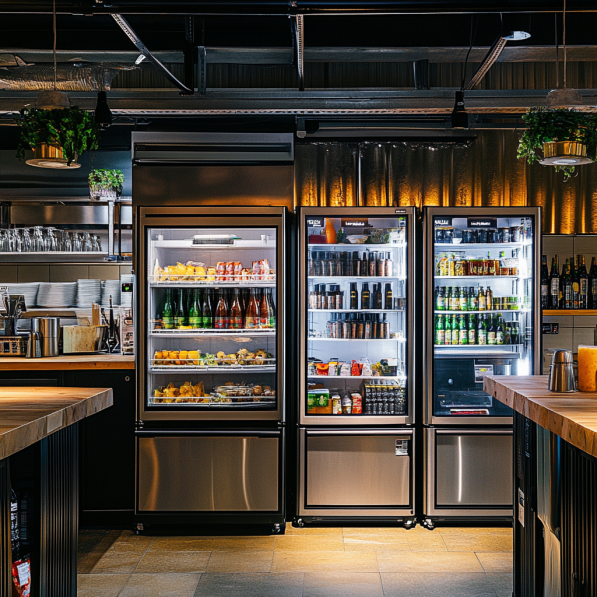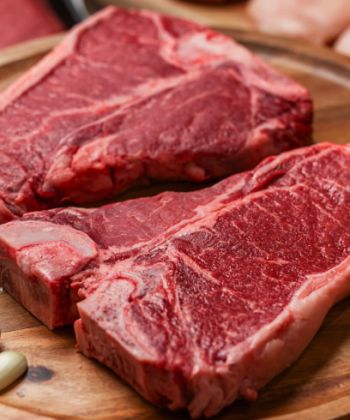
The world of restaurants is a fast-moving one, and proper refrigeration is the hallmark of food safety, waste reduction, and efficiency. As the demand for continuous and reliable cooling increases, technology innovations are also vastly changing the game for industrial refrigerator maintenance. The integration of IoT and AI has changed the face of refrigerator system monitoring and maintenance in restaurants, providing predictive maintenance, remote monitoring, and energy efficiency incomparable to anything ever seen.
Let’s take a glimpse into how these technologies are changing the face of refrigeration management across restaurants and why these technologies have become indispensable for today’s food industry.
1. Role of IoT in Revolutionizing Refrigerator Maintenance
IoT technology has evolved to become an indispensable resource for monitoring industrial refrigerators. Integration of sensors and smart devices into the refrigeration units lets restaurants monitor in real time the state of temperature, humidity, and energy consumption.
- Predictive Maintenance: Since IoT sensors operate by continuously recording data, restaurants can detect an imminent malfunction that might show up as a temperature fluctuation, failure of a compressor, or a refrigerant leak before the problem reaches critical dimensions. This offers predictive maintenance with minimization of breakdowns and avoidance of costly emergency repairs.
- Remote Monitoring: This can enable restaurant managers or maintenance teams to observe remotely the refrigeration units installed at their premises. You will be able to track performance data from anywhere through a mobile app or web platform to make sure your refrigerators always stay within optimum ranges, even when you are offsite.
- Why It Matters: The ability to remotely monitor industrial refrigerators not only increases operational efficiencies but also minimizes the risk of spoiled inventory, which is generally quite a crucial concern in restaurant settings.
2. AI-Driven Insights for Smart Refrigeration Management
AI further escalates the IoT technology through analysis of huge sets of data collected and further provides actionable insights from it. AI can detect patterns, predict equipment failures, give their best use to optimize energy usage, thus making industrial refrigerator maintenance smarter.
- Energy Efficiency: Intelligent algorithms analyzed how refrigeration is used and energy consumed, enabling finer control of cooling systems. By modifying the cooling cycles in non-peak hours, energy use is reduced and operational costs minimized.
- Self-Learning Systems: AI systems can adaptively learn from the specific conditions surrounding your refrigeration units in the restaurant and optimize settings based on environmental conditions and historical data. This provides for greater refrigeration system efficiency, requiring less human intervention.
- Why It Matters: Refrigeration in restaurants is one of the largest consumers of energy. While AI-driven systems make sure refrigerators work efficiently, restaurants also save on their energy bills and reduce carbon emissions.
3. Benefits of Predictive Maintenance in Restaurant Settings
Unforeseen refrigeration breakdowns are considered the biggest nightmare for restaurant owners. This may lead to food spoilage and further hamper smooth operations besides the cost of repair. IoT and AI predictive maintenance helps avoid this.
- Reducing Downtime: Predictive maintenance locates the potential issues before they get critical, hence allowing the staff in restaurants to schedule repairs at convenient times, which results in less disruption to the business.
- Minimum Equipment Downtime: Regular maintenance with timely repairs prolongs the uptimes of refrigeration units, thus avoiding very costly replacement and prolonging the life of very expensive equipment.
- Why It Matters: Such predictive maintenance provides restaurants with an unprecedented possibility to prevent unplanned breakdowns, guarantee food safety, and keep seamless operation during peak hours.
4. Enhancement of Food Safety with Real-time Monitoring
But most importantly, within the food safety restaurant industry, IoT-powered refrigeration adds another level of security to ensure all perishable goods are kept at a safe temperature.
- Temperature Notifications: IoT sensors will send out notifications in real time if the internal refrigerator temperature drifts out of the preferred range. These can easily be delivered via email or text message to a restaurant manager for immediate action if an issue were to arise.
- Complying with Health Regulations: Most restaurants are bound to adhere to strict health and safety regulations, which call for very cautious record-keeping. IoT and AI systems log temperatures automatically, thus making life easier for restaurants regarding compliance to assure the passing of health inspections.
- Why It Matters: Restaurants can reduce the risks associated with food spoilage and contamination and make certain that their food is safe and of quality by means of real-time monitoring and instant alerts.
5. Energy Efficiency: Contributing to Greener Restaurants
Sustainability will be one of the fundamental focuses in the restaurant business, and smart refrigeration systems are among the solid contributors toward reaching energy-saving goals. AI and IoT serve to optimize not only the cooling performance of restaurants but also trace ecological traces and reduce them.
- Energy Consumption Monitoring: IoT systems produce detailed reports on energy consumption and, therefore, owners know the points of ineffectiveness and where adjustments should be made. The provided data can be used to make operational adjustments to reduce energy use.
- Sustainability Efforts: AI-driven insights have opened ways for restaurants in order to find more sustainable practices that are energy-saving by optimizing operation for refrigeration units. Restaurants can go further with their commitment to sustainability through the adoption of green energy solutions enabled by smart technologies.
- Why It Matters: As sustainability and efficiency continue to take center stage, smart refrigeration affords restaurants the opportunity to make a positive impact on their carbon footprint for a greener future while reaping savings operationally.
Conclusion: The Future of Restaurant Refrigeration
Because the integration of IoT and AI into industrial refrigerator maintenance is revolutionary to the restaurant world—from predictive maintenance that prevents costly repairs to energy-saving solutions reducing the cost of operation—these technologies are a must for the modern-day restaurant.
It’s by embracing intelligent refrigeration systems that food service operators can ensure food safety and quality while increasing efficiency, reducing energy use, and contributing to a more sustainable future.
For more expert advice and the latest trends on smart restaurant management, check out Restaurant Web Expert.


